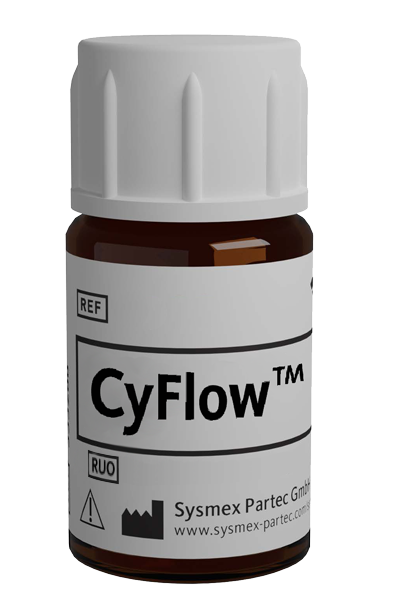CyFlow™ CD62L Alexa Fluor™ 700

| Alternative Name: | L-selectin |
| Antibody: | Yes |
| Antigen: | CD62L |
| Application: | Flow cytometry |
| Clonality: | monoclonal |
| Clone: | DREG56 |
| Emission Maximum: | 723 nm |
| Excitation Maximum: | 702 nm |
| Field of Interest: | Immunophenotyping |
| Format/Fluorochrome: | Alexa Fluor™ 700 |
| Isotype: | IgG1 |
| Laser: | Red |
| Regulatory Status: | RUO |
| Source Species: | Mouse |
| Target Species: | Human |
| Product number: | AU807163 |
For Research Use Only
| Quantity | 100 tests |
| Volume | 0.4 mL |
| Immunogen | PMA-activated human peripheral blood leukocytes |
| Background Information | CD62L (L-selectin) is an adhesion glycoprotein that is constitutively expressed on the cell surface of leukocytes and mediates their homing to inflammatory sites and peripheral lymph nodes by enabling rolling along the venular wall. CD62L is also involved in activation-induced neutrophil aggregation. Activation-dependent CD62L shedding, however, counteracts neutrophil rolling. CD62L has also signaling roles including enhance of chemokine receptor expression. Similarly to CD62P, the major ligand of CD62L is PSGL-1 (P-selectin glycoprotein ligand-1). The level of CD62L expression can be used to help distinguish naive T cells from effector/memory T cells. |
| Usage | The reagent is designed for Flow Cytometry analysis of human blood cells. Recommended usage is 4·µl reagent·/ 100·µl of whole blood or 10^6 cells in a suspension. The content of a vial (0.4 ml) is sufficient for 100 tests. |
| Storage Buffer | The reagent is provided in stabilizing phosphate buffered saline (PBS) solution, pH ≈7.4, containing 0.09% (w/v) sodium azide. |
| Storage | Avoid prolonged exposure to light. Store in the dark at 2-8°C. Do not freeze. |
| Stability | Do not use after expiration date stamped on vial label. |
| Kishimoto TK, Jutila MA, Butcher EC: Identification of a human peripheral lymph node homing receptor: a rapidly down‑regulated adhesion molecule. Proc Natl Acad Sci USA. 1990 Mar; 87(6):2244‑8. < PMID: 2179952 > | Kishimoto TK, Warnock RA, Jutila MA, Butcher EC, Lane C, Anderson DC, Smith CW: Antibodies against human neutrophil LECAM‑1 (LAM‑1/Leu‑8/DREG‑56 antigen) and endothelial cell ELAM‑1 inhibit a common CD18‑independent adhesion pathway in vitro. Blood. 1991 Aug 1; 78(3):805‑11. < PMID: 1713515 > | Doussis IA, Gatter KC, Mason DY: CD68 reactivity of non‑macrophage derived tumours in cytological specimens. J Clin Pathol. 1993 Apr; 46(4):334‑6. < PMID: 7684403 > | Kishimoto T, Goyert S, Kikutani H, Mason D, Miyasaka M, Moretta L, Ohno T, Okumura K, Shaw S, Springer TA, Sugamura K, Sugawara H, von dem Borne AEGK, Zola H (Eds): Leucocyte Typing VI. Garland Publishing Inc, New York. 1997; 1‑1342. < NLM ID: 9712219 > | Abraham WM, Ahmed A, Sabater JR, Lauredo IT, Botvinnikova Y, Bjercke RJ, Hu X, Revelle BM, Kogan TP, Scott IL, Dixon RA, Yeh ET, Beck PJ: Selectin blockade prevents antigen‑induced late bronchial responses and airway hyperresponsiveness in allergic sheep. Am J Respir Crit Care Med. 1999 Apr; 159(4‑1):1205‑14. < PMID: 10194167 > | Jutila MA, Kurk S, Jackiw L, Knibbs RN, Stoolman LM: L‑selectin serves as an E‑selectin ligand on cultured human T lymphoblasts. J Immunol. 2002 Aug 15; 169(4):1768‑73. < PMID: 12165498 > | Xu T, Chen L, Shang X, Cui L, Luo J, Chen C, Ba X, Zeng X: Critical role of Lck in L‑selectin signaling induced by sulfatides engagement. J Leukoc Biol. 2008 Oct; 84(4):1192‑201. < PMID: 18653462 > | Killock DJ, Parsons M, Zarrouk M, Ameer-Beg SM, Ridley AJ, Haskard DO, Zvelebil M, Ivetic A: In Vitro and in Vivo Characterization of Molecular Interactions between Calmodulin, Ezrin/Radixin/Moesin, and L‑selectin. J Biol Chem. 2009 Mar 27; 284(13):8833‑45. < PMID: 19129194 > | Tu W, Mao H, Zheng J, Liu Y, Chiu SS, Qin G, Chan PL, Lam KT, Guan J, Zhang L, Guan Y, Yuen KY, Peiris JS, Lau YL: Cytotoxic T lymphocytes established by seasonal human influenza cross‑react against 2009 pandemic H1N1 influenza virus. J Virol. 2010 Jul; 84(13):6527‑35. < PMID: 20410263 >
